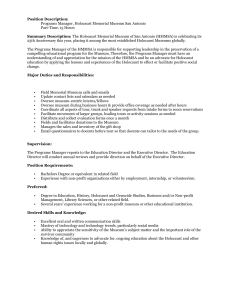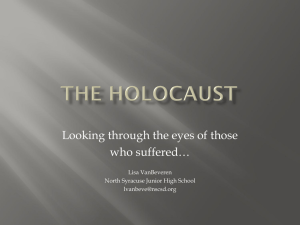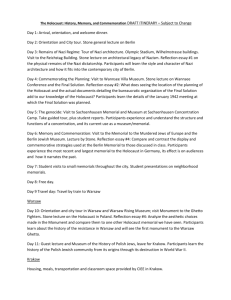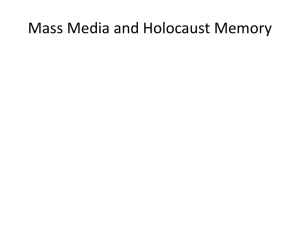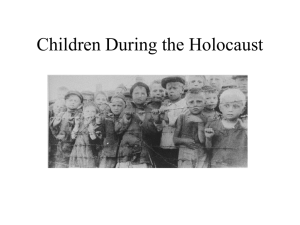Peter Hayes to Speak on Big Business, the Holocaust, and the
advertisement
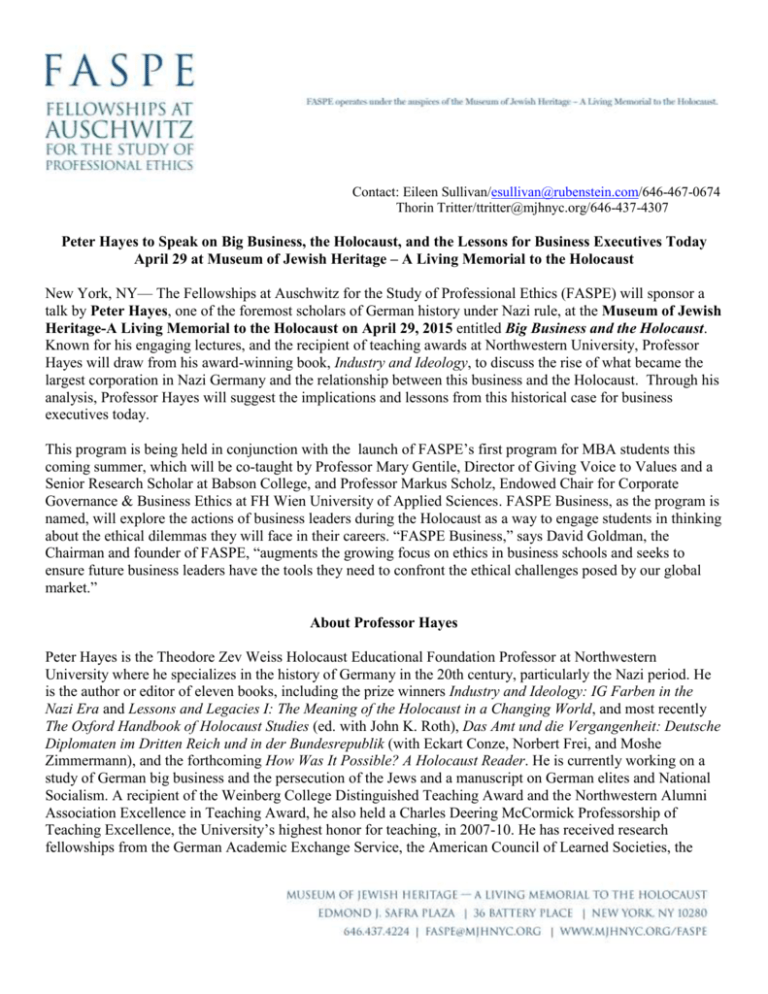
Contact: Eileen Sullivan/esullivan@rubenstein.com/646-467-0674 Thorin Tritter/ttritter@mjhnyc.org/646-437-4307 Peter Hayes to Speak on Big Business, the Holocaust, and the Lessons for Business Executives Today April 29 at Museum of Jewish Heritage – A Living Memorial to the Holocaust New York, NY— The Fellowships at Auschwitz for the Study of Professional Ethics (FASPE) will sponsor a talk by Peter Hayes, one of the foremost scholars of German history under Nazi rule, at the Museum of Jewish Heritage-A Living Memorial to the Holocaust on April 29, 2015 entitled Big Business and the Holocaust. Known for his engaging lectures, and the recipient of teaching awards at Northwestern University, Professor Hayes will draw from his award-winning book, Industry and Ideology, to discuss the rise of what became the largest corporation in Nazi Germany and the relationship between this business and the Holocaust. Through his analysis, Professor Hayes will suggest the implications and lessons from this historical case for business executives today. This program is being held in conjunction with the launch of FASPE’s first program for MBA students this coming summer, which will be co-taught by Professor Mary Gentile, Director of Giving Voice to Values and a Senior Research Scholar at Babson College, and Professor Markus Scholz, Endowed Chair for Corporate Governance & Business Ethics at FH Wien University of Applied Sciences. FASPE Business, as the program is named, will explore the actions of business leaders during the Holocaust as a way to engage students in thinking about the ethical dilemmas they will face in their careers. “FASPE Business,” says David Goldman, the Chairman and founder of FASPE, “augments the growing focus on ethics in business schools and seeks to ensure future business leaders have the tools they need to confront the ethical challenges posed by our global market.” About Professor Hayes Peter Hayes is the Theodore Zev Weiss Holocaust Educational Foundation Professor at Northwestern University where he specializes in the history of Germany in the 20th century, particularly the Nazi period. He is the author or editor of eleven books, including the prize winners Industry and Ideology: IG Farben in the Nazi Era and Lessons and Legacies I: The Meaning of the Holocaust in a Changing World, and most recently The Oxford Handbook of Holocaust Studies (ed. with John K. Roth), Das Amt und die Vergangenheit: Deutsche Diplomaten im Dritten Reich und in der Bundesrepublik (with Eckart Conze, Norbert Frei, and Moshe Zimmermann), and the forthcoming How Was It Possible? A Holocaust Reader. He is currently working on a study of German big business and the persecution of the Jews and a manuscript on German elites and National Socialism. A recipient of the Weinberg College Distinguished Teaching Award and the Northwestern Alumni Association Excellence in Teaching Award, he also held a Charles Deering McCormick Professorship of Teaching Excellence, the University’s highest honor for teaching, in 2007-10. He has received research fellowships from the German Academic Exchange Service, the American Council of Learned Societies, the Harry Frank Guggenheim Foundation, and the U.S. Holocaust Memorial Museum. In June 2014, he became the chair of the Academic Committee at the USHMM. About FASPE The Fellowships at Auschwitz for the Study of Professional Ethics, run under the auspices of the Museum of Jewish Heritage – A Living Memorial to the Holocaust, is an innovative set of programs for professional school students – preparing for careers in business, law, medicine, journalism, and the clergy – that examine contemporary ethical issues, using the Holocaust, and the role the specific professions played in Nazi Germany, as a launching point and backdrop. The FASPE experience offers a more intensive and meaningful exploration into ethics than is available in any classroom-based course in graduate school. FASPE immerses students in history by taking them to the sites where Nazi-era executives, doctors, lawyers, journalists, and clergy worked, and where the consequences of their actions unfolded. It invokes the power of place as a pedagogical tool to emphasize the importance of ethical behavior among professionals today. Fellows participate in seminars with leading scholars and professionals. They also visit sites such as: the House of the Wannsee Conference, where lawmakers laid plans for the “Final Solution;” the Deportation Memorial “Track 17,” one of the train platforms where Berlin’s Jews were forced to board trains heading to camps; and Auschwitz-Birkenau where over one million were murdered and atrocious medical experiments took place. To view a video, and specific topics that FASPE fellows will study in the individual programs, visit www.FASPE.info. FASPE was piloted in 2009 and is a non-denominational program engaging participants of all faiths. Twelve to fifteen Fellows from each discipline are chosen annually, through an international application process. FASPE works in cooperation with the Center for Holocaust Studies at Jagiellonian University, Krakow; the Haus der Wannsee-Konferenz, Berlin; and the Auschwitz-Birkenau State Museum, Oświęcim, Poland. The initial curricula were designed in partnership with leading scholars from Yale Medical School, Yale Law School, Columbia School of Journalism and Georgetown University. Lead support for FASPE is provided by David Goldman, Frederick and Margaret Marino, and the Eder Family Foundation. Additional support is provided by the Conference on Jewish Material Claims Against Germany and other generous donors. About the Museum of Jewish Heritage—A Living Memorial to the Holocaust The Museum’s exhibitions educate people of all ages and backgrounds about the rich tapestry of Jewish life over the past century—before, during, and after the Holocaust. Current special exhibitions include A Town Known as Auschwitz, and Designing Home: Jews and Midcentury Modernism. It is also home to the awardwinning Keeping History Center, an interactive visitor experience, and Andy Goldsworthy’s memorial Garden of Stones. The Museum offers visitors a vibrant public program schedule in its Edmond J. Safra Hall and receives general operating support from the New York City Department of Cultural Affairs.
